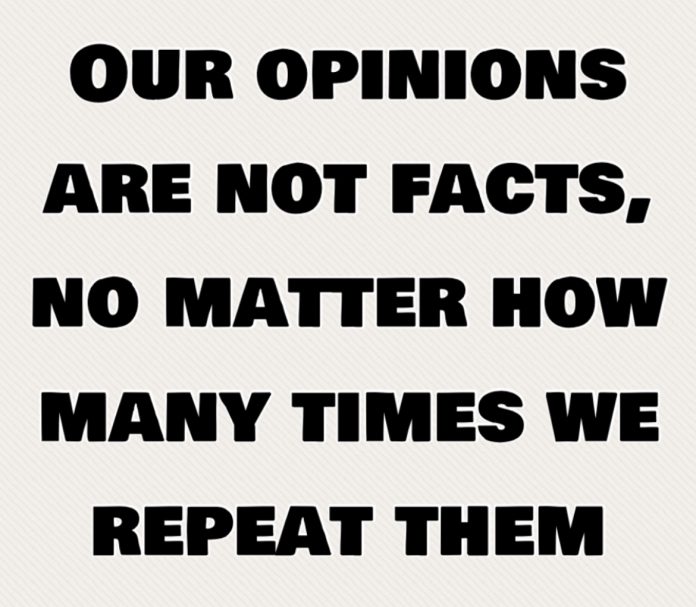Let us start here with this statement from 2021:

and then progress to determining why however interesting opinions might be, they are a mere quark in the universe of facts.
In an era dominated by rapid information exchange and social media influence, the distinction between facts and opinions has become increasingly blurred. The rise of “fake news” and misinformation campaigns has further complicated the landscape, often leaving people confused about what is real and what is merely conjecture. In this context, it is crucial to reaffirm the importance of facts over opinions. Facts, grounded in evidence and reality, form the foundation upon which informed decisions, productive discourse, and societal progress are built. This article explores why facts are far more important than opinions, highlighting their role in education, decision-making, media, and democracy.
The Nature of Facts and Opinions
To begin, it is essential to clarify the distinction between facts and opinions. A fact is an objective statement that can be verified with evidence. For example, “The Earth orbits the Sun” is a fact because it can be demonstrated and corroborated by scientific observation and data. In contrast, an opinion is a subjective belief or interpretation that reflects an individual’s personal feelings, preferences, or perspectives. An example would be, “I think the Earth is the most beautiful planet in the solar system.” This statement is inherently subjective and cannot be universally proven or disproven.
While opinions can be valuable in expressing individual perspectives and fostering debate, they should not be confused with facts. The conflation of the two can lead to misinformation and misunderstandings, especially when opinions are presented as if they are factual truths.
The Role of Facts in Education
Education is fundamentally rooted in the transmission and acquisition of knowledge. Facts serve as the building blocks of this knowledge, enabling learners to understand the world around them and to develop critical thinking skills. Without a solid foundation of factual information, education becomes meaningless, as it would rely on subjective interpretations rather than objective reality.
For instance, in science education, students are taught facts about the natural world, such as the laws of physics or the principles of chemistry. These facts are established through rigorous experimentation and evidence-based research. Teaching these facts equips students with a reliable framework for understanding complex concepts and phenomena. If science education were to be based on opinions rather than facts, students would be left with a disjointed and unreliable understanding of the world, which could hinder scientific progress and innovation.
Moreover, a fact-based education encourages the development of analytical and critical thinking skills. Students learn to differentiate between what can be proven and what is merely speculative, fostering a mindset that values evidence and logical reasoning. This is particularly important in a digital age where misinformation is rampant, and the ability to discern credible sources from dubious ones is crucial.
Facts in Decision-Making
Facts are equally indispensable in decision-making processes, whether at an individual, organisational, or governmental level. Informed decisions are those made on the basis of accurate and relevant information, rather than personal biases or uninformed opinions. This principle applies across various contexts, from personal health choices to public policy.
For example, consider a person making a decision about their diet. If they rely on scientifically validated nutritional facts, such as the importance of a balanced intake of macronutrients and vitamins, they are more likely to make choices that benefit their health. In contrast, if they base their dietary decisions on unfounded opinions or popular trends that lack scientific backing, they may inadvertently harm their health.
In the realm of public policy, decision-makers must rely on factual data to address societal issues effectively. For instance, when formulating policies to combat climate change, governments need to consider empirical data on greenhouse gas emissions, deforestation, and renewable energy potential. Basing such policies on opinions rather than facts could result in ineffective or even harmful outcomes. This highlights why it is crucial for policymakers to differentiate between fact and opinion and to prioritise evidence-based approaches.
The Role of Media in Upholding Facts
The media plays a pivotal role in shaping public perception and discourse. It is, therefore, the responsibility of journalists and media outlets to report facts accurately and to distinguish them clearly from opinions. When media blurs the line between factual reporting and editorial commentary, it can mislead the public and contribute to the spread of misinformation.
In recent years, the proliferation of online news sources and social media platforms has made it easier for misinformation to spread. Sensationalism, clickbait, and opinion-driven content often overshadow fact-based reporting, creating an environment where opinions are presented as though they hold the same weight as facts. This trend is dangerous because it can distort public understanding of critical issues and erode trust in credible news sources.
To combat this, it is vital for media outlets to adhere to journalistic standards that prioritise fact-checking and evidence-based reporting. Journalists should strive to present information in a clear and unbiased manner, allowing readers to distinguish between what is factual and what is opinion-based commentary. This approach not only helps to build public trust but also ensures that the media fulfils its role as a pillar of democracy by keeping the populace informed and engaged.
The Impact of Opinions on Democracy
While opinions are an integral part of democratic discourse, they must be informed by facts to contribute meaningfully to the democratic process. Democracies thrive on the free exchange of ideas, but for this exchange to be productive, it must be grounded in reality. When public opinion is shaped more by emotions and misinformation than by facts, the democratic process is undermined.
For example, during elections, voters rely on information to make informed choices about the candidates and policies they support. If this information is based on factual reporting, voters can make decisions that align with their values and the best interests of society. However, if voters are influenced by false information or opinion masquerading as fact, they may be misled into supporting policies or candidates that do not serve their interests or the common good.
The recent rise of populist movements in various democracies around the world illustrates the dangers of opinion-driven politics. These movements often exploit emotional appeals and misinformation to sway public opinion, diverting attention from factual evidence and reasoned debate. This can lead to the erosion of democratic norms, the polarisation of societies, and the implementation of policies that are not based on sound evidence.
Facts as the Foundation of Progress
Progress, whether social, scientific, or economic, depends on a firm grounding in facts. Innovations and advancements arise from a clear understanding of reality and the application of this understanding to solve problems and improve conditions. Opinions, while they can inspire ideas and debates, do not in themselves lead to progress unless they are backed by factual evidence.
In the realm of science, for example, major breakthroughs have been achieved through rigorous research and experimentation, rooted in empirical facts. The development of vaccines, the exploration of space, and the understanding of genetics have all been made possible by a steadfast commitment to factual knowledge. Had these fields relied on opinions rather than facts, such progress would have been impossible.
Similarly, economic progress is driven by policies and practices based on factual analysis. Governments and businesses rely on economic data, such as employment rates, inflation, and GDP growth, to make decisions that affect millions of lives. When these decisions are informed by facts, they are more likely to lead to positive outcomes, such as job creation, poverty reduction, and sustainable development. Conversely, decisions based on opinions, without a factual basis, can lead to economic instability and hardship.
The Dangers of Ignoring Facts
The consequences of disregarding facts can be severe, both at an individual and societal level. When facts are ignored, misconceptions and false beliefs can take root, leading to misguided actions and policies.
One stark example is the denial of climate change. Despite overwhelming scientific evidence, some individuals and political groups continue to reject the facts about global warming and its human causes. This denial has delayed crucial actions needed to mitigate the impact of climate change, putting ecosystems and human societies at risk. By prioritising opinions over facts in this context, we jeopardise the future of the planet.
Another example is the spread of misinformation during the COVID-19 pandemic. False information about the virus, its transmission, and vaccines has led to confusion and fear, complicating public health efforts. In some cases, individuals acted on misinformation rather than facts, resulting in harmful outcomes, such as the use of ineffective treatments or refusal to get vaccinated. This demonstrates how the elevation of opinion over fact can have dire consequences for public health and safety.
The Ethical Responsibility to Prioritise Facts
There is an ethical imperative to prioritise facts over opinions, particularly for those in positions of influence, such as educators, policymakers, and media professionals. When these individuals present opinions as though they are facts, they mislead others and contribute to a culture of misinformation.
For educators, this means ensuring that teaching is based on the best available evidence and that students are equipped with the skills to critically evaluate information. For policymakers, it involves making decisions based on data and research rather than personal beliefs or political expediency. For media professionals, it requires a commitment to accurate reporting and a clear distinction between fact and opinion.
In a broader sense, each individual has a responsibility to seek out factual information and to question the sources of the opinions they encounter. This is particularly important in a digital age, where anyone can publish content and where misinformation can spread rapidly. By valuing facts over opinions, individuals contribute to a more informed and rational society.
In conclusion, while opinions play a valuable role in personal expression and democratic debate, they cannot substitute for facts. Facts provide a reliable foundation for education, decision-making, and societal progress. They are essential for the functioning of democracy, the advancement of science, and the well-being of individuals and societies. In an age of misinformation, it is more important than ever to uphold the value of facts and to recognise their superiority over opinions. Only by doing so can we ensure that our decisions, debates, and policies are grounded in reality and serve the common good.
KEEP US ALIVE and join us in helping to bring reality and decency back by SUBSCRIBING to our Youtube channel: https://www.youtube.com/channel/UCQ1Ll1ylCg8U19AhNl-NoTg AND SUPPORTING US where you can: Award Winning Independent Citizen Media Needs Your Help. PLEASE SUPPORT US FOR JUST £2 A MONTH https://dorseteye.com/donate/







